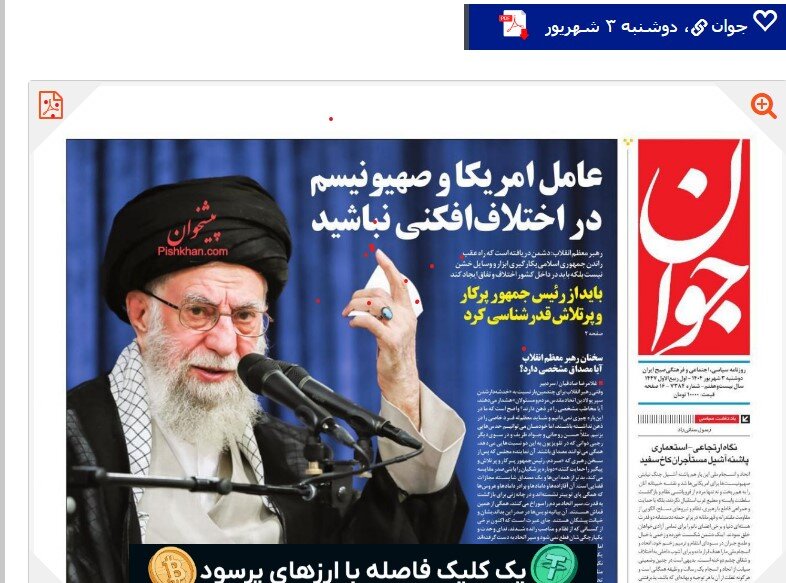Naval drill manifests Iran’s strategic power

TEHRAN - Javan wrote a commentary on the Navy's drill codenamed “durable might”. It said: One of the most important strategic decisions of the Islamic Republic after the 12-day imposed war is to try to determine the rules of the game at the regional level; an action for which the restoration and enhancement of combat and defense capabilities are the starting point and main support. Another important pillar is overcoming all-around threats of enemies, both at home and abroad, using internal capacities.
Accordingly, strengthening Iran's strategy in both defensive and offensive dimensions must be made clear to the enemies. In this context, Iran's "durable might" drill can be considered the first strategic maneuver in the post-war period, which, with its cross-border geographical scope in the waters of the northern Indian Ocean and the Sea of Oman and the use of precision-guided cruise missiles, will be a starting point for strengthening Iran's strategy in confronting enemies. The reaction of prominent world media, especially Hebrew media, to this drill shows that Iran has succeeded in consolidating its strategic power and establishing its deterrence against threats.
Siasat-e-Rooz: Main players’ decision could shape future of nuclear diplomacy
In an analysis, Siasat-e-Rooz discussed the West’s struggle to activate the snapback mechanism on Iran and wrote: The new round of Iran’s negotiations with the UK, Germany, France and the European Union will be held on Tuesday. However, evidence shows that the West, by magnifying the risk of activation of the snapback mechanism, is seeking to force Iran to extend it, which is a kind of legitimizing the sanctions and pressure that will pave the way for its implementation. Estimates show the possibility of an extension has increased slightly, but in any case, the Europeans will not abandon this leverage in order to keep themselves involved in the Iran nuclear file. The role of the United States could also be important in this; Washington could intensify the pressure by preventing the extension or joining Europe in managing the crisis. The Iranian nuclear file is at a sensitive stage, where the decisions of the main players could determine the future of diplomacy. Iran has repeatedly shown that it is ready for constructive and transparent cooperation, but Europe and the United States must prove that they are committed to their international commitments.
Jam-e-Jam: Unity is key to victory and survival of the revolution
In its commentary, Jam-e-Jam reviewed the Leader of the Revolution’s Sunday address by interviewing political expert Mohammad Saeed Ahadian, who observed: Experience has shown that despite some weaknesses, victory can be achieved in the military arena through prudence, faith, and leadership. This issue was clearly observed during the recent 12-day imposed war. The country's military and political forces, with courage and tact, were able to compensate weaknesses and deal a blow to the enemy. It cannot be denied that unity and leadership are the two key factors in these achievements. If unity prevails, the path to economic reforms can also be paved. The enemy is very much waiting to create division and exploit internal differences. Those who speak in extreme terms on both sides of the political wings or those who actually provide a basis for misperception of the enemy by signaling weakness all play a role in weakening internal cohesion. Differences of opinion are natural and inevitable in the political environment, but what is decisive is the intention behind those differences; if the intention is to help the country, even harsh criticism is tolerable.
Ettelaat: Agreement with IAEA more important than Europeans
In an interview with Ali Bigdeli, a senior foreign policy expert, Ettelaat discussed the looming negotiations with the European trio (Britain, France and Germany) and Iran's foreign policy approach. He said: Negotiations between the three European countries and Iran on the extension of Resolution 2231 will begin at the level of deputy foreign ministers, as Tehran emphasizes Europe's incompetence to use the snapback mechanism. We still have time, yet the scope for negotiation has been significantly reduced. The scope for bargaining has been greatly reduced, and our final decision is still not clear. We must negotiate with the Europeans in particular on this issue, but the International Atomic Energy Agency is more important. The Agency's report goes to the Board of Governors, where European countries are present, and the board decides based on the comprehensive report of the IAEA. And the three countries that pushed for the resolution against Iran (at the IAEA board) must be convinced. If they are not convinced, and if Iran does not allow the Agency to enter and monitor the case through the path it wishes, the case will definitely go to the Security Council, and the sanctions will return.
